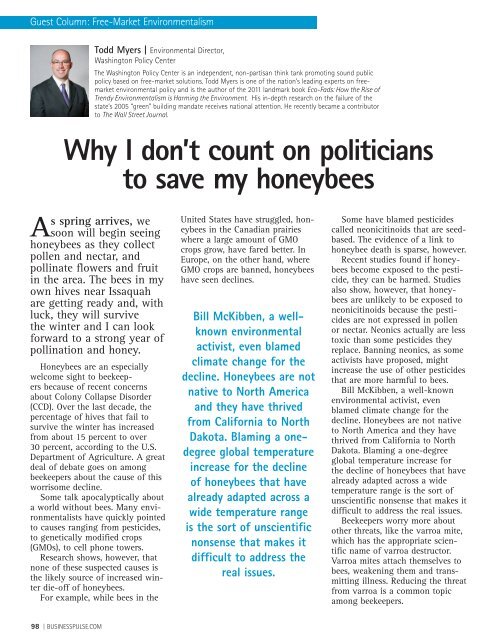Business Pulse
You also want an ePaper? Increase the reach of your titles
YUMPU automatically turns print PDFs into web optimized ePapers that Google loves.
Guest Column: Free-Market Environmentalism<br />
Todd Myers | Environmental Director,<br />
Washington Policy Center<br />
The Washington Policy Center is an independent, non-partisan think tank promoting sound public<br />
policy based on free-market solutions. Todd Myers is one of the nation’s leading experts on freemarket<br />
environmental policy and is the author of the 2011 landmark book Eco-Fads: How the Rise of<br />
Trendy Environmentalism is Harming the Environment. His in-depth research on the failure of the<br />
state’s 2005 “green” building mandate receives national attention. He recently became a contributor<br />
to The Wall Street Journal.<br />
Why I don’t count on politicians<br />
to save my honeybees<br />
As spring arrives, we<br />
soon will begin seeing<br />
honeybees as they collect<br />
pollen and nectar, and<br />
pollinate flowers and fruit<br />
in the area. The bees in my<br />
own hives near Issaquah<br />
are getting ready and, with<br />
luck, they will survive<br />
the winter and I can look<br />
forward to a strong year of<br />
pollination and honey.<br />
Honeybees are an especially<br />
welcome sight to beekeepers<br />
because of recent concerns<br />
about Colony Collapse Disorder<br />
(CCD). Over the last decade, the<br />
percentage of hives that fail to<br />
survive the winter has increased<br />
from about 15 percent to over<br />
30 percent, according to the U.S.<br />
Department of Agriculture. A great<br />
deal of debate goes on among<br />
beekeepers about the cause of this<br />
worrisome decline.<br />
Some talk apocalyptically about<br />
a world without bees. Many environmentalists<br />
have quickly pointed<br />
to causes ranging from pesticides,<br />
to genetically modified crops<br />
(GMOs), to cell phone towers.<br />
Research shows, however, that<br />
none of these suspected causes is<br />
the likely source of increased winter<br />
die-off of honeybees.<br />
For example, while bees in the<br />
United States have struggled, honeybees<br />
in the Canadian prairies<br />
where a large amount of GMO<br />
crops grow, have fared better. In<br />
Europe, on the other hand, where<br />
GMO crops are banned, honeybees<br />
have seen declines.<br />
Bill McKibben, a wellknown<br />
environmental<br />
activist, even blamed<br />
climate change for the<br />
decline. Honeybees are not<br />
native to North America<br />
and they have thrived<br />
from California to North<br />
Dakota. Blaming a onedegree<br />
global temperature<br />
increase for the decline<br />
of honeybees that have<br />
already adapted across a<br />
wide temperature range<br />
is the sort of unscientific<br />
nonsense that makes it<br />
difficult to address the<br />
real issues.<br />
Some have blamed pesticides<br />
called neonicitinoids that are seedbased.<br />
The evidence of a link to<br />
honeybee death is sparse, however.<br />
Recent studies found if honeybees<br />
become exposed to the pesticide,<br />
they can be harmed. Studies<br />
also show, however, that honeybees<br />
are unlikely to be exposed to<br />
neonicitinoids because the pesticides<br />
are not expressed in pollen<br />
or nectar. Neonics actually are less<br />
toxic than some pesticides they<br />
replace. Banning neonics, as some<br />
activists have proposed, might<br />
increase the use of other pesticides<br />
that are more harmful to bees.<br />
Bill McKibben, a well-known<br />
environmental activist, even<br />
blamed climate change for the<br />
decline. Honeybees are not native<br />
to North America and they have<br />
thrived from California to North<br />
Dakota. Blaming a one-degree<br />
global temperature increase for<br />
the decline of honeybees that have<br />
already adapted across a wide<br />
temperature range is the sort of<br />
unscientific nonsense that makes it<br />
difficult to address the real issues.<br />
Beekeepers worry more about<br />
other threats, like the varroa mite,<br />
which has the appropriate scientific<br />
name of varroa destructor.<br />
Varroa mites attach themselves to<br />
bees, weakening them and transmitting<br />
illness. Reducing the threat<br />
from varroa is a common topic<br />
among beekeepers.<br />
98 | BUSINESSPULSE.COM

















